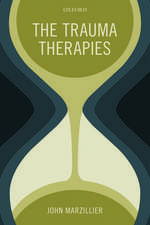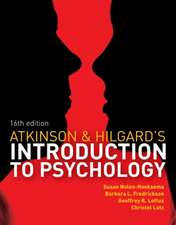Metacognitive Therapy for Anxiety and Depression
Autor Adrian Wellsen Limba Engleză Paperback – 13 mai 2011
This groundbreaking book explains the "whats" and "how-tos" of metacognitive therapy (MCT), an innovative form of cognitive-behavioral therapy with a growing empirical evidence base. MCT developer Adrian Wells shows that much psychological distress results from how a person responds to negative thoughts and beliefs—for example, by ruminating or worrying—rather than the content of those thoughts. He presents practical techniques and specific protocols for addressing metacognitive processes to effectively treat generalized anxiety disorder, obsessive–compulsive disorder, posttraumatic stress disorder, and major depression. Special features include reproducible treatment plans and assessment and case formulation tools, plus a wealth of illustrative case material.
Preț: 341.63 lei
Nou
Puncte Express: 512
Preț estimativ în valută:
65.37€ • 68.26$ • 53.98£
65.37€ • 68.26$ • 53.98£
Carte disponibilă
Livrare economică 25 martie-08 aprilie
Livrare express 08-14 martie pentru 32.83 lei
Preluare comenzi: 021 569.72.76
Specificații
ISBN-13: 9781609184964
ISBN-10: 1609184963
Pagini: 316
Ilustrații: black & white line drawings, black & white tables, figures
Dimensiuni: 152 x 229 x 23 mm
Greutate: 0.46 kg
Ediția:1
Editura: Guilford Publications
Colecția Guilford Press
ISBN-10: 1609184963
Pagini: 316
Ilustrații: black & white line drawings, black & white tables, figures
Dimensiuni: 152 x 229 x 23 mm
Greutate: 0.46 kg
Ediția:1
Editura: Guilford Publications
Colecția Guilford Press
Public țintă
Professional Practice & DevelopmentCuprins
1. Theory and Nature of Metacognitive Therapy
2. Assessment
3. Foundation Metacognitive Therapy Skills
4. Attention Training Techniques
5. Detached Mindfulness Techniques
6. Generalized Anxiety Disorder
7. Posttraumatic Stress Disorder
8. Obsessive–Compulsive Disorder
9. Major Depressive Disorder
10. The Evidence for Metacognitive Theory and Therapy
11. Concluding Thoughts
Appendices
1. Metacognitions Questionnaire 30 (MCQ-30)
2. Meta-Worry Questionnaire (MWQ)
3. Thought Fusion Instrument (TFI)
4. Attention Training Technique Summary Sheet
5. Self-Attention Rating Scale
6. CAS-1
7. Generalized Anxiety Disorder Scale—Revised (GADS-R)
8. Posttraumatic Stress Disorder Scale (PTSD-S)
9. Obsessive–Compulsive Disorder Scale (OCD-S)
10. Major Depressive Disorder Scale (MDD-S)
11. GAD Case Formulation Interview
12. PTSD Case Formulation Interview
13. OCD Case Formulation Interview
14. Depression Case Formulation Interview
15. GAD Treatment Plan
16. PTSD Treatment Plan
17. OCD Treatment Plan
18. Depression Treatment Plan
19. New Plan Summary Sheet
Notă biografică
Adrian Wells, PhD, is Professor of Clinical and Experimental Psychopathology at the University of Manchester, United Kingdom, and Professor II in Clinical Psychology at the Norwegian University of Science and Technology, Trondheim, Norway. He is internationally known for his contributions to understanding psychopathological mechanisms and advancing cognitive-behavioral therapy, particularly for anxiety disorders. The originator of metacognitive therapy, Dr. Wells has published over 130 scientific papers, chapters, and books. He is Associate Editor of the journals Behavioural and Cognitive Psychotherapy and Cognitive Behaviour Therapy, and is a Founding Fellow of the Academy of Cognitive and Behavioral Therapies. Dr. Wells is a founder and director of the Metacognitive Therapy Institute and a patron of the charity Anxiety UK.
Recenzii
"Wells has written a very important book, rich in clinical understanding and practical guidance. Metacognitive therapy is based on a well-developed and thoroughly tested model that addresses core disordered processes, including attentional bias and rumination. The procedures he describes will be enormously useful to therapists of all persuasions, and can form the bedrock of low-intensity and high-intensity interventions for a wide range of disorders."--Chris R. Brewin PhD, Department of Clinical, Educational, and Health Psychology (Emeritus), University College London, United Kingdom
"Metacognitive Therapy for Anxiety and Depressionoffers a strategy for addressing those well-learned and hard-to-fix thinking patterns that can be tough to change. As a clinician who has struggled with helping people work through dysfunctional thinking patterns, I can appreciate the usefulness of Wells's methods. Metacognitive therapy helps both the patient and the therapist take a step back from the sometimes repetitive work of cognitive therapy, and lends a new perspective with the potential for breaking through treatment roadblocks. Well done!"--Monica Ramirez Basco, PhD, Associate Director for Science Policy, Planning, and Analysis, Office of Research on Women's Health, National Institutes of Health
"The metacognitive model is based on years of research on the nature of different levels and processes of thinking underlying psychological disorders. Clinicians who read this revolutionary book will be able to utilize techniques found nowhere else. Intriguing, creative, and effective clinical strategies are illustrated with clear case examples that demonstrate how to modify recurrent patterns of rumination, worry, and overreliance on problematic processes of thinking. Chapters on specific disorders provide tools and conceptualizations that take the cognitive model in new and exciting directions. I highly recommend this brilliant contribution."--Robert L. Leahy, PhD, Department of Psychiatry, Weill Cornell Medical College, New York Presbyterian Hospital
"This book presents a new and innovative approach that focuses on how patients think, as much as what they believe. It is firmly grounded in basic science and packed full of powerful clinical strategies for helping people change the way they think. Wells shows how attention training and detached mindfulness techniques can be applied to a full array of anxiety and depressive disorders with impressive and lasting results. His approach will appeal to clinical practitioners, students, and mental health researchers alike, and should find widespread acceptance in the clinical community. It should prove to be a valuable tool for graduate training across professional disciplines."--Steven D. Hollon, PhD, Department of Psychology, Vanderbilt University-
Adrian Wells' publication of MCT is an excellent practical guide for practitioners and provides substantial scientific evidence. This book will be of great value to post-graduate students, researchers, academicians, clinicians, and practitioners.
--Anxiety, Stress, and Coping, 3/16/2011ƒƒIn sum, MCT is a new and novel treatment and an exciting addition to the third wave of behavior therapy....Serves as a repository/summary of [Wells'] work to date—a treatment manual that combines his theories, conceptualizations, assessment measures, and interventions into a cohesive approach....Therapists trained in more traditional CBT will undoubtedly be very interested in how some of the MCT techniques might work with their current patients who are seemingly 'stuck' using more traditional cognitive techniques.
--PsycCRITIQUES, 3/16/2011ƒƒThis book will be relevant and of interest to psychologists, psychiatrists, and other mental health care workers, as well as students of these disciplines....4 Stars!
--Doody's Review Service, 3/16/2011Descriere
This groundbreaking book explains the "whats" and "how-tos" of metacognitive therapy (MCT), an innovative form of cognitive-behavioral therapy with a growing empirical evidence base. MCT developer Adrian Wells shows that much psychological distress results from how a person responds to negative thoughts and beliefs—for example, by ruminating or worrying—rather than the content of those thoughts. He presents practical techniques and specific protocols for addressing metacognitive processes to effectively treat generalized anxiety disorder, obsessive–compulsive disorder, posttraumatic stress disorder, and major depression. Special features include reproducible treatment plans and assessment and case formulation tools, plus a wealth of illustrative case material.















